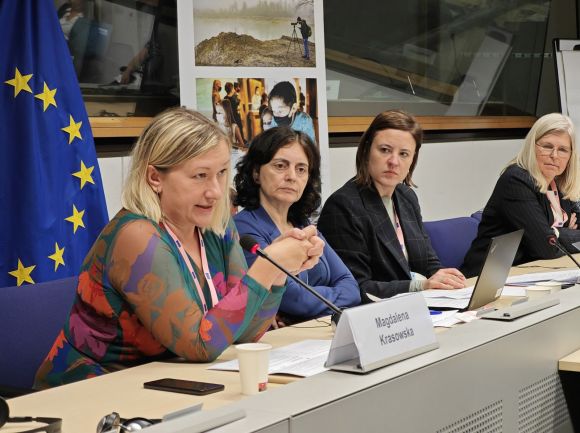
On October 9, 2024, the European Committee of the Regions in Brussels hosted the session “Every voice matters: experiences in citizen engagement at local level” during this year's edition of the European Week of Regions and Cities.
Representatives of the European Union along with local NGO leaders Magdalena Krasowska
from Poland, Iliyana Nikolova from Bulgaria, and Ragna Fidjestol from Norway discussed how they promote citizen engagement and democratic participation at local level, and how their struggles can be alleviated with the EU's help.
In recent years, democracy and civic freedoms in the EU have been under serious threat both from national and foreign actors. Some of the NGOs of member countries focusing on citizen engagement and democratic participation at a local level feel that the European legislators are not doing enough to support their fight. In their country, they face a lack of state support or even active discouragement - be it Hungary, Bulgaria, or others currently experiencing a shift in the national policy to the far right.
“We are observing so-called civil society deserts, regions in which civil society is very weak,” says Iliyana Nikolova, Bulgarian CEO of Workshop for Civic Initiatives Foundation and member of the Civil Society Council at Council of Ministers.
“One of the causes is the lack of reliable funding. Civil society NGOs are operational only based on project funding, which makes their work unstable and they cannot invest in capacity building and organisational development. Also, this funding is channelled through the state. This makes these NGOs very volatile and fragile in the light of the current political climate,” she adds.
“For example, the EU Citizens, Equality, Rights and Values (CERV) programme focuses on developing open, rights-based, democratic, equal, and inclusive societies. It has a different mode of funding, as it allows for direct support to civil society organisations” notes Valeria Setti, Deputy Head of Unit at the European Commission, about what can be done to help them on the EU level.
Still, it may not be enough, thinks the Polish representative. “NGOs are not capable of diversifying their sources of funding, so they become dependent on local governments again, which compromises their independence," clarifies Magdalena Krasowska from the Information Society Development Foundation. She also agrees that the project-only funding is proving problematic.
If the EU programmes aim to safeguard democracy and human rights, it is vital to provide civil society with the resources and freedom they need, especially in regions facing growing political challenges. As Krasowska points out, "NGOs need more than project funding — they need long-term investment in their independence and capacity to advocate for citizens' rights."
On top of that, they often have to deal with hostile environments, particularly when advocating for the rights of marginalised groups within region.
"Civil society organisations have been the subject of aggressive smear campaigns by certain political groups and media outlets, labeling them as 'anti-national' or 'agents of foreign influence.' These narratives undermine the credibility of NGOs and deter citizens from engaging with or supporting them," warns Krasowska.
"In Hungary, we've seen an increasingly hostile climate for NGOs, particularly those advocating for human rights and democracy. The government has introduced laws targeting foreign-funded organizations, branding them as 'foreign agents.' This kind of legislative pressure creates fear and discourages both local and international support," adds Nikolova.
"The most effective way to counter these challenges is through transparency, collaboration, and grassroots engagement. We need to be completely open about our funding and operations so that we can gain the trust of our communities. At the same time, building bridges between other civil society groups strengthens our collective voice. Engaging directly with local communities helps to demonstrate that we are here to serve them, not foreign interests," concludes the Bulgarian representative.
By Patricie Martinů



